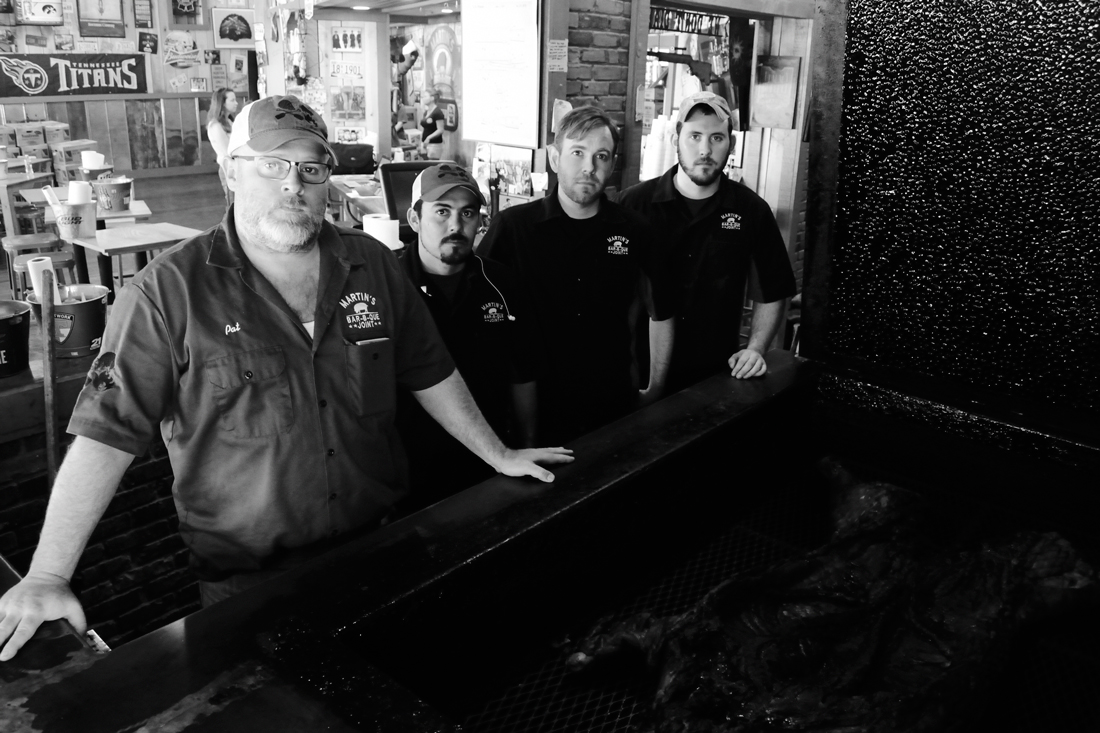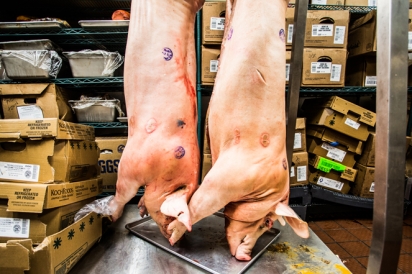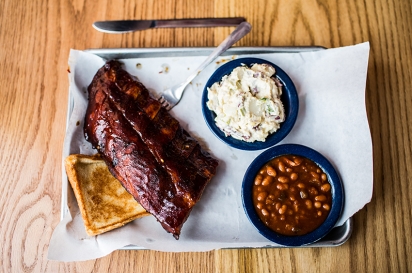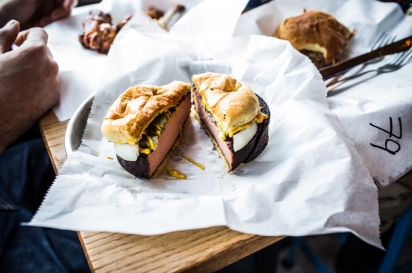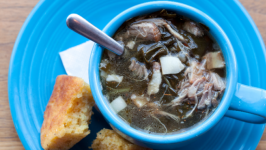Pat Martin & the Students of BBQ
The Beginning
Pitmaster Pat Martin has a history of success moving in directions most people wouldn't expect. After graduating from Freed-Hardeman University, he moved to the bond trading desk at financial firms in Chicago and New York City. You'd think his trajectory would lead him up the corporate ladder to a life of wearing suits and wingtip shoes and earning big bank. Instead, Martin decided to dedicate his life to another important skill he learned while in college in West Tennessee, cooking whole hog barbecue. Whole hog being the key words there. And now he's taking steps to pass on his knowledge to a new generation of apprentice pitmasters at his locations of Martin's Bar-B-Que Joint.
“When I was in college, there were eleven joints in Lexington, TN that cooked whole hogs. (Most BBQ joints …do what…? ) Now it's down to four. It hit me a few years ago, that if I was going to continue to grow, these skills need to go on.” As Martin's has continued to expand with four locations in two states (and at least two more on the drawing board), Martin knows he can't do it all himself. “I wanted (needed?) some apprentices to expand our bench. We've missed out on some opportunities in the past to grow because we didn't have employees who could cook a hog. I go to great extremes to do it the right way.”
Those extremes include moving away from the modern gas-fired rotisserie smokers that are stashed in back of some barbecue joints that allow meat (parts?) to be cooked low and slow with very little human interaction. Martin's uses these “barbecuebots” as well, but Pat Martin is consciously moving back to the days of low-tech live fire cooking. Every Martin's location is built around an open brick pit which brings diners closer to the experience of a whole hog cooking over smoldering wood and smoke.
Hand Made
“It's the hard way to cook,” shares Martin. “We don't have any thermometers or thermostats. You need to be able to lay hands on the pit and know if it's running hot or cool. It's all on feel. There's no button to push or dial to turn.” He learned to cook hogs that way while a student at Freed-Hardeman from a local Henderson pitmaster named Harold Thomas. “I just wanted to be able to cook hogs for fraternity parties, but Harold let me come in at night and help him cook hogs, and I was hooked. He selfishly taught me, because at some point he needed to go home and get some sleep!”
With his new apprentice program, Martin is teaching a new generation of pitmasters. He has assembled a group of eight employees (guys?) from varying backgrounds, ranging from his first and third employees at the original Martin's to a young Harvard graduate to an old college buddy with a family background steeped in West Tennessee whole hog barbecue traditions. Together, this group represents the future of the business. “My goal is to start up new Martin's locations, wherethe cooking can be done right. To grow, you have to pass the skill set along.”
Martin plans the apprentice program to last at least two years, moving through positions as line cooks to picking cooked meats at Martin's custom prep tables to finally working on the pits at one of the current locations. “These are solid guys who have been here for awhile that have taken an active interest in the art of cooking. They're the guys who never come in late and never call in sick.”
Martin offers a great deal of autonomy to his apprentices once they make it to the pit or smoking chickens and ribs in Backwoods smokers that he has recently installed at Martin's Belmont Boulevard location. “They're the only ones allowed to touch the meat. They have 100% veto power over food decisions. They won't pull the chickens early just because there's a line out the door. If the food isn't ready to serve, people will just have to wait or order something else.”
The apprentices and new smokers will allow Martin's to cook smaller batches of meat more often, four times a day for pork shoulders and beef briskets and six times daily for ribs and chicken. This will ensure fresher food and better quality, because you won't find a microwave or a freezer in any Martin's location. Still, occasionally the complicated calculus of barbecue production will occasionally fall short of demand, and there's no way to rush great smoked meat.
“People are shocked when barbecue places run out of food,” notes Martin. “But that's the point. We can't read the future or just put on another hog when the first one is picked clean. We're cooking as much as we think we need, but you can rest assured that all the food we serve is as fresh off the smoker as we can possibly make it.”
With the investment in time and money that Martin is putting into his apprentices, doesn't he worry that they'll one day run off and start their own restaurants? Well that’s the point. To pass on the tradition of whole hog cooking. “If they start their own places, I'll be glad to have been a part of it.”
Martin is confident that his apprentices will be ready when they graduate from his program. “If you can cook a whole hog, you can do anything.”


